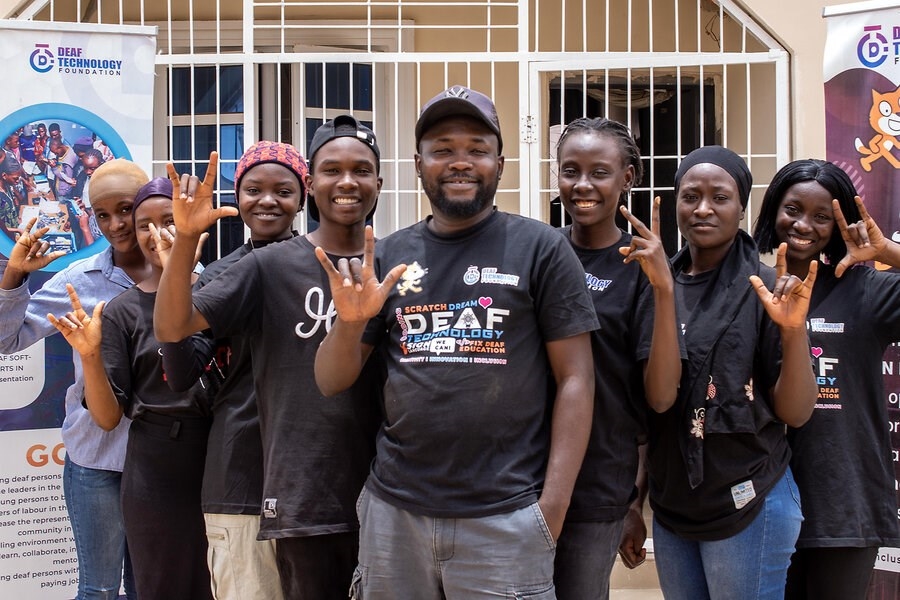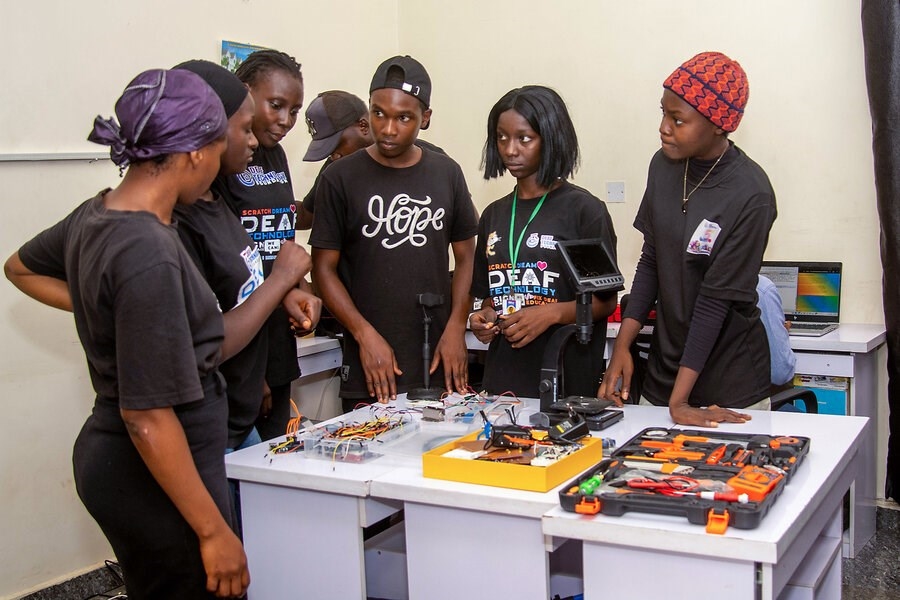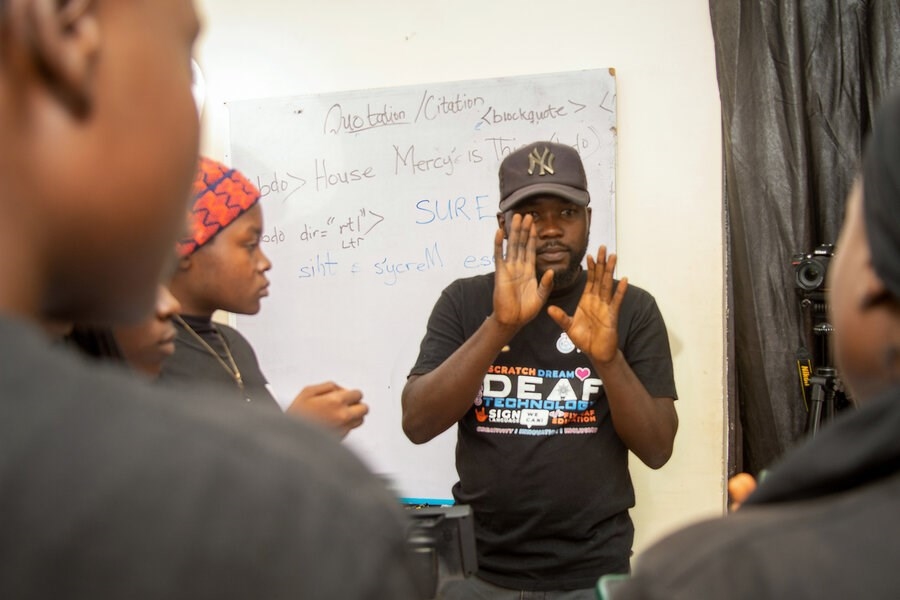REPRINTED WITH PERMISSION FROM THE CHRISTIAN SCIENCE MONITOR
Deaf students often feel excluded from educational opportunities in Nigeria. The Deaf Technology Foundation sees their potential.
 Wuni Bitrus (center) and some of his students sign “I love you” in Jos, Nigeria. “This is what I love doing,” Mr. Bitrus says of his work with the Deaf Technology Foundation, which he co-founded. Nathaniel Bivan
Wuni Bitrus (center) and some of his students sign “I love you” in Jos, Nigeria. “This is what I love doing,” Mr. Bitrus says of his work with the Deaf Technology Foundation, which he co-founded. Nathaniel Bivan
| JOS, NIGERIA - In a one-room apartment in Jos, Nigeria, instructor Wuni Bitrus and almost a dozen students gather around a table cluttered with equipment – a toolbox, a 12-volt adapter, a coding panel, a set of jumper cables, a mix of colored wires. The students’ idea: to build the prototype for a “smart” door that opens with the touch of a finger.
The students chat back and forth in sign language, and Mr. Bitrus signs back. The group discusses using Arduino, an open-source electronics platform, and one student wonders how fingerprints can be stored. Mindful of Nigeria’s electricity problems, Mr. Bitrus genially advises the group to use a battery-powered keypad lock system first and incorporate a fingerprint feature later.
“It works well, rather than waste time reinventing the wheel,” Mr. Bitrus says. After nodding in agreement, the students excitedly start working.
This is just another afternoon in a club run by the Deaf Technology Foundation, a nonprofit co-founded by Mr. Bitrus in 2017 that trains Nigerian children and young adults who are deaf in computer programming and robotics. The students also work to improve their reading skills, and receive career guidance and counseling to help them believe in themselves.
Mr. Bitrus’ driving force? “Compassion,” he says, because deaf people in Nigeria “are limited in so many ways.”
 Nathaniel BivanStudents deliberate as they work on the prototype for a biometric door.
Nathaniel BivanStudents deliberate as they work on the prototype for a biometric door.
His desire to change the prospects of Nigeria’s deaf and hard-of-hearing community was sparked in 2014 by his encounter with a 13-year-old girl while he was teaching as part of the National Youth Service Corps in Zamfara state. Mr. Bitrus had noticed that the teen faced discrimination, and he became determined to learn sign language and teach her to use a computer. Three years later, he marshaled the resources, including funding from the Massachusetts Institute of Technology, to form the Deaf Technology Foundation.
Call her Mama Robotics
One of the darkest memories that Mercy Samson Grimah, a foundation student, has about growing up is looking at the faces of people around her and recognizing insults and negative energy directed at her.
“That hurt me so bad because I knew in my heart that I could do anything. They just see us as lesser human beings,” she says. “I wanted to show them that deaf people can become whatever they want to be.”
(Mr. Bitrus interpreted the students’ comments for this article.)
Ms. Grimah says her private secondary school did not formally teach sign language to her, nor much of anything else. But there was one teacher who knew how to sign, and she taught Ms. Grimah. When Mr. Bitrus visited Ms. Grimah’s school to promote the work of the Deaf Technology Foundation, she was happy to see that “he could sign,” too.
She dropped out in her third year because her parents could not pay her school fees, but fortunately, she had already formed a bond with the Deaf Technology Foundation.
“I had never touched a laptop before in my life,” she says. Now, she wants to become a computer scientist – and answers to the nickname Mama Robotics.
Five years ago, Ms. Grimah and several other students made a road trip from Jos to Nigeria’s capital, Abuja, to compete in MakeX, a robotics contest. The team had practiced for about 18 hours. In the end, it built robots to perform tasks such as cleaning trash in a model city. Although Ms. Grimah’s team was not chosen to go on to represent Nigeria in the international competition, it emerged fourth among about 15 teams.
“Our team was the only one made up of the deaf,” says Ms. Grimah, her eyes lighting up.
 Nathaniel BivanMr. Bitrus tutors a Deaf Technology Foundation class in Jos.
Nathaniel BivanMr. Bitrus tutors a Deaf Technology Foundation class in Jos.
Her father, Grimah Samson, adds, “What they are doing changed her. The day we are not able to transport her here [to the Deaf Technology Foundation for club activities], she isn’t happy. We pray that God opens doors for her and the other children to make something of themselves.”
Shut out of the sciences
Mercy Sale wanted to study to become a computer scientist, but her school told her that, as a deaf student, she could not.
In October 2019, Ms. Sale was part of a Deaf Technology Foundation team that flew to the Netherlands. It was among teams from 10 organizations around the world that competed for the Nothing About Us Without Us Award, which goes to nonprofits working with marginalized or disadvantaged communities.
“I started seeing the reward for where technology can take me,” Ms. Sale says. Now, she wants to be a web developer.
Joy Yusuf, another Deaf Technology Foundation student, had wanted to become a doctor. But she was moved to a new school where the principal and staff said there was no way that could happen, even though the school welcomed students with disabilities.
“It was a blow for me,” Ms. Yusuf says. “I cried. I had to call Mr. Bitrus and my father to beg them, but [the principal and staff] still refused. For me, Deaf Tech is the only way I can have anything close to [studying] medicine.”
Now, she, too, wants to become a web developer.
The Deaf Technology Foundation’s major challenge is a lack of funding. There are only two paid tutors for computer programming and robotics, and the number of students keeps growing. Thirty-four students on average attend classes four days a week, but that number can rise to 70 when students are on breaks from their regular studies. To loosen up, they all gather twice a week for sports and dance.
In addition to the three clubs that the Deaf Technology Foundation has started in Jos, it has one each in Zamfara state and Abuja. Most of the foundation’s volunteers are older students who help conduct sports activities for club members on a temporary basis, Mr. Bitrus explains.
“This is what I love doing,” he says, adding that he hopes, in time, to see his students train others.
To scale up, the foundation aims to take advantage of the technology boom in Nigeria, particularly in the robotics sector. It hopes to partner with Jos-based companies on, for example, self-driving car technology and automated wheelchairs.
Lengdung Tungchamma, co-founder of Jenta Reads, a community initiative that aims to improve reading skills in impoverished areas of Jos, has worked with the foundation for a couple of years.
“The most important thing about Deaf Tech is the passion of its leaders and founders,” he says. “Giving people with [disabilities] skills that they can use to earn an income and make a future for themselves is the best thing anyone can do.
“People need to see that disability is not a death sentence or the end of life. ... That’s what Deaf Tech does. It just gives hope to people.”
Page created on 6/19/2024 2:24:23 PM
Last edited 6/19/2024 2:34:57 PM
